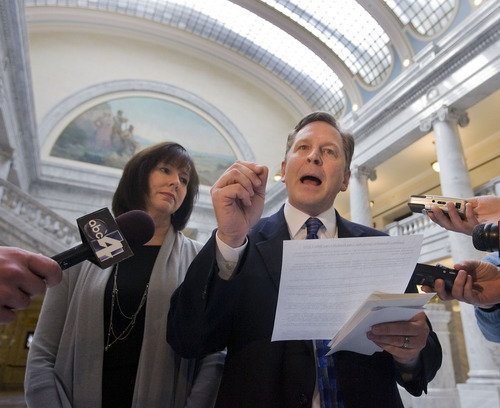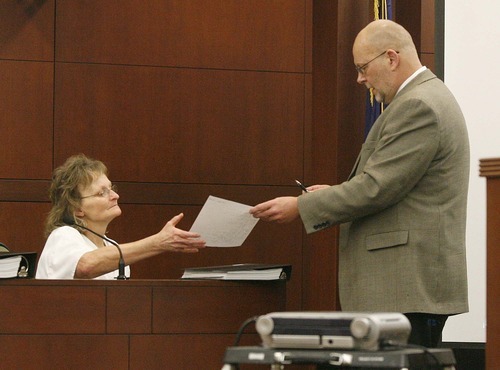This is an archived article that was published on sltrib.com in 2011, and information in the article may be outdated. It is provided only for personal research purposes and may not be reprinted.
Craig Frank formally resigned his disputed legislative seat Friday afternoon, dropping his crusade to be seated in the House when it convenes Monday, but calling on his colleagues to fix the boundary mistake that led to his ouster.
"For the 2,550 disenfranchised people on the northern boundaries of the City of Cedar Hills, I call on the people's representatives of the Utah State Legislature to rectify this injustice," he said after delivering his letter of resignation to House Speaker Becky Lockhart. "The people have placed their trust in their state and county elections leaders and have been let down."
Sen. John Valentine, who also represents a portion of Cedar Hills now in legislative limbo, said he plans to push a bill in the first week of the session to redraw boundaries to include Cedar Hills neighborhoods that had been voting in the wrong elections since 2002.
If the Legislature moves quickly enough to redraw the boundaries, it is possible that Frank could be selected to fill the vacancy when Republican delegates in the district meet Jan. 29 to pick his replacement.
Frank said he will make a decision whether to run depending on what the Legislature does and after consulting with his family.
"We'll take care of you," freshman Sen. Daniel Thatcher, R-West Valley City, told Frank after his news conference.
For nearly two weeks, Frank has been at the center of a drama over whether or not he would lose the House seat he was re-elected to last November because he lives outside of the district.
An errant map prepared by the Utah County Clerk in 2001 included portions at the north end of Cedar Hills that Frank moved into in January 2009. But those neighborhoods were not actually part of House District 57, making Frank ineligible to serve in the House under the Utah Constitution.
Frank had tenaciously fought to be seated, claiming he was the duly elected representative from the district, and had vowed to force a vote in the House when it convenes Monday on whether or not he should be seated — even though only a handful of his GOP colleagues, voting in a closed meeting, would support the move.
Bipartisan House leaders had also made a strong statement this week, voting unanimously that Frank did not live in his district and was ineligible to serve. Lt. Gov. Greg Bell also opined that Frank did not live in the district boundaries.
Frank said Friday that the issue had become too focused on him, instead of the 2,550 Cedar Hills residents — 600 of whom voted in the last election — who, because of the Utah County Clerk's error, didn't get to vote for the legislators who would now be representing them.
Colleagues, he said, were too concerned about the perception of cronyism if they were to re-draw the boundaries.
"My resignation will allow the Legislature to move forward, unencumbered, to correct errors in statute," he said.
But if the Legislature does not act, he warned, he has neighbors and constituents who have said they will go to court to challenge the boundaries.
Lockhart, whose campaign for House speaker Frank helped spearhead, said in a statement she expects the issue will be addressed once the session starts on Monday.
"Craig has always been known as a man of upstanding character and he showed why today," said Lockhart. "We share his concern about the portion of residents from Cedar Hills who have not had the rightful opportunity to vote for their representation."
Karen Herd, the precinct chairwoman in one of the northern Cedar Hills precincts, said Frank called her early Friday morning to tell her of his decision.
"Part of me thinks it's the right thing to do because it will make it possible to give us back our vote, but I'm torn," she said. "I think he's got a lot of courage."
It remains to be seen if two-thirds of the House and Senate support the new boundaries, which would be required for them to take effect immediately. Otherwise it would be 60 days before they took effect.
"We intend to solve the problem whether he was in or out, because the people will not have a say [if we don't]," Valentine said.
Valentine said he is confident he can get support from two-thirds of the Senate. In a closed caucus this week, 35 House Republicans said they would support the revision, but nine were absent and Frank said some may be willing to reconsider now that he is out of the equation.







